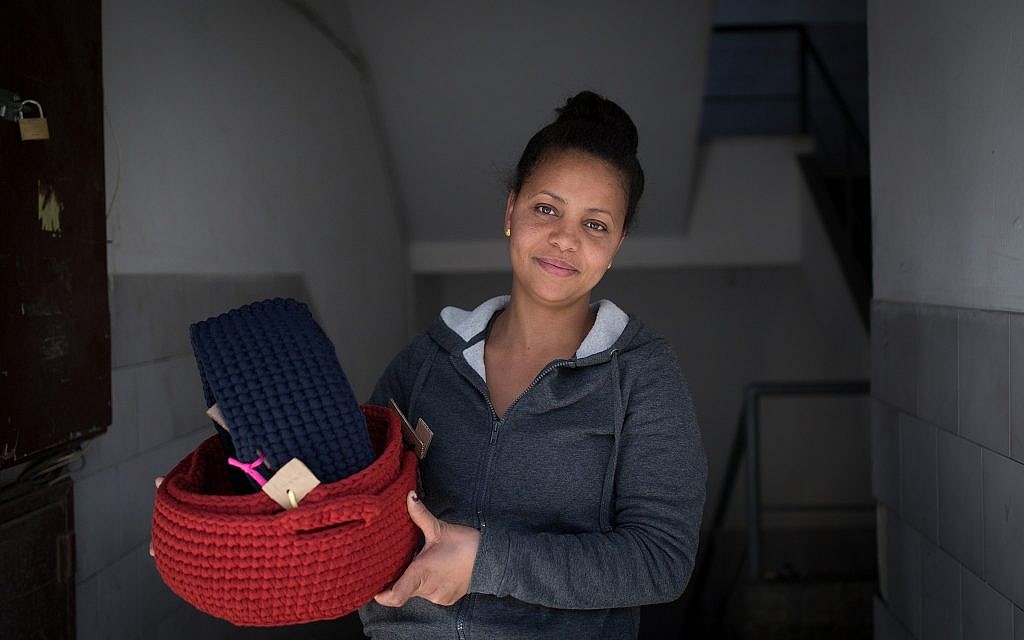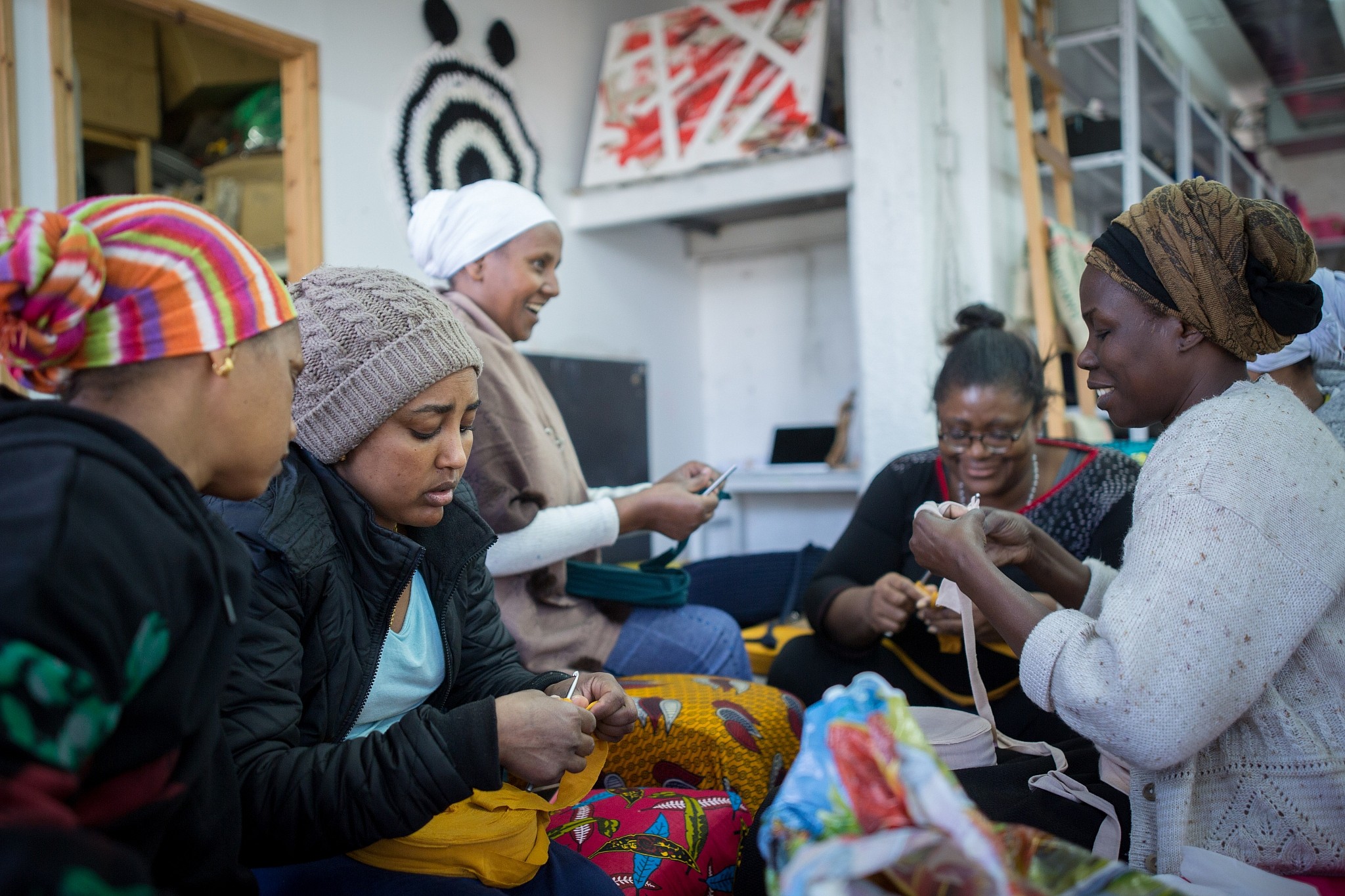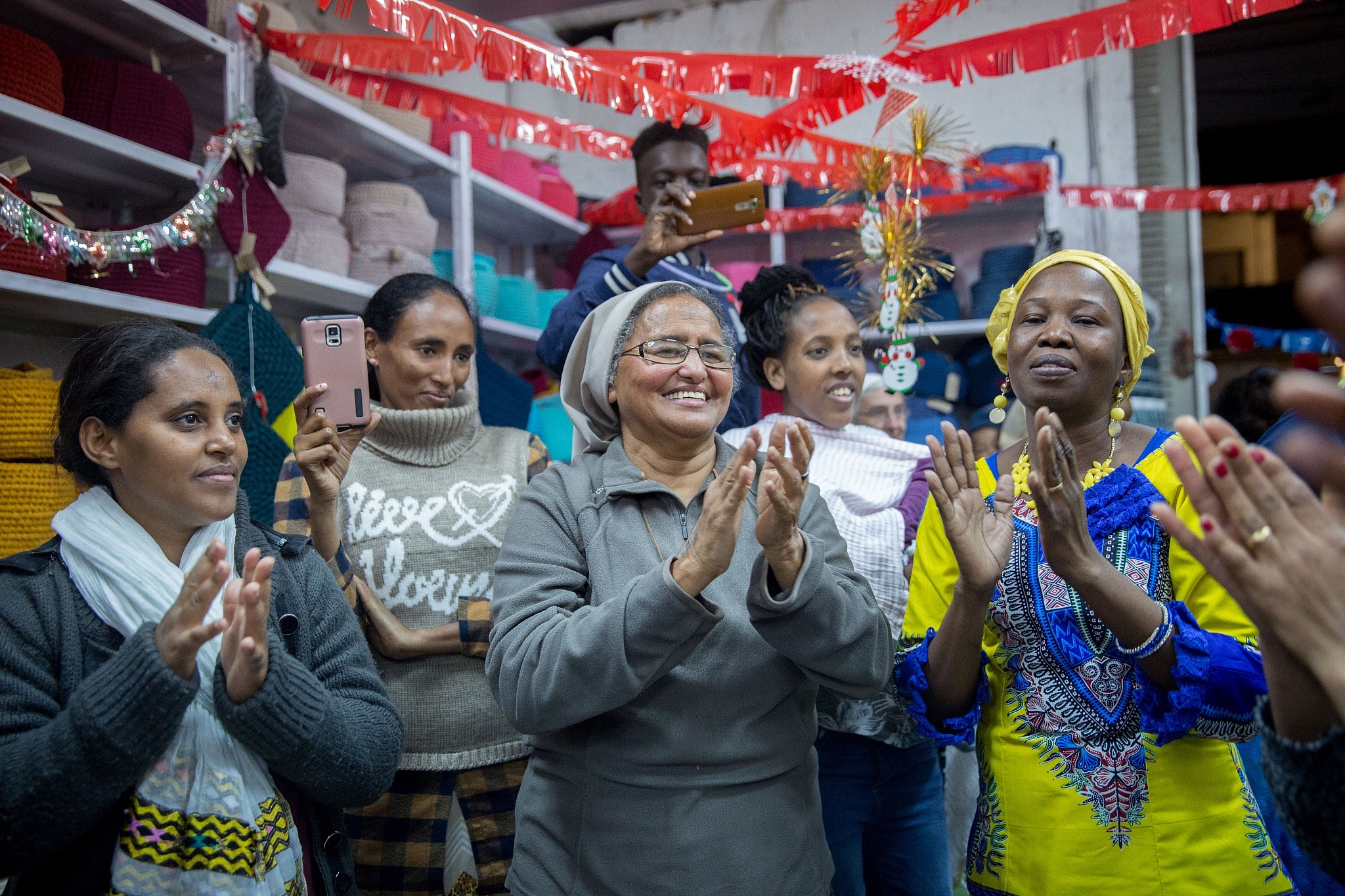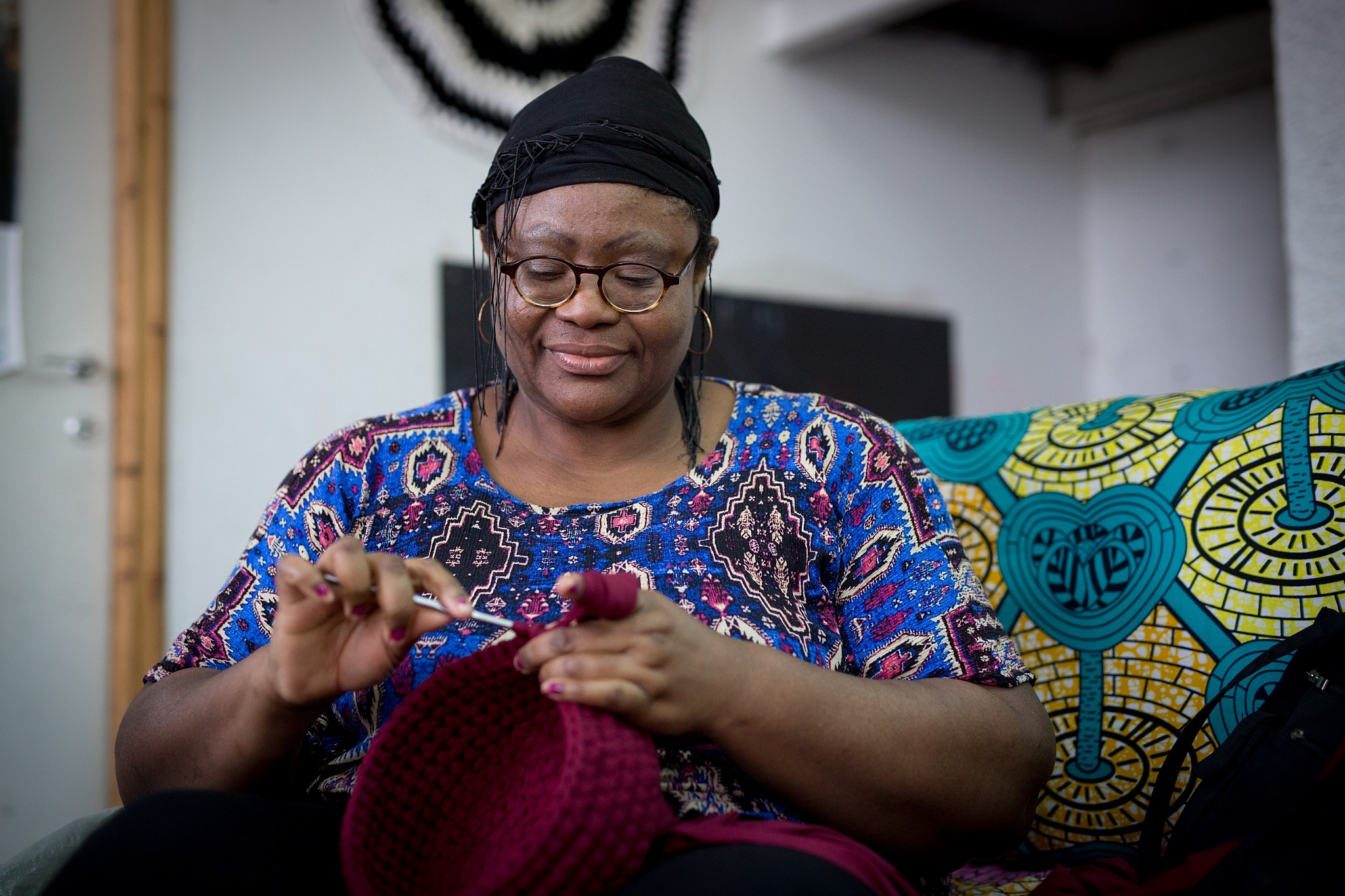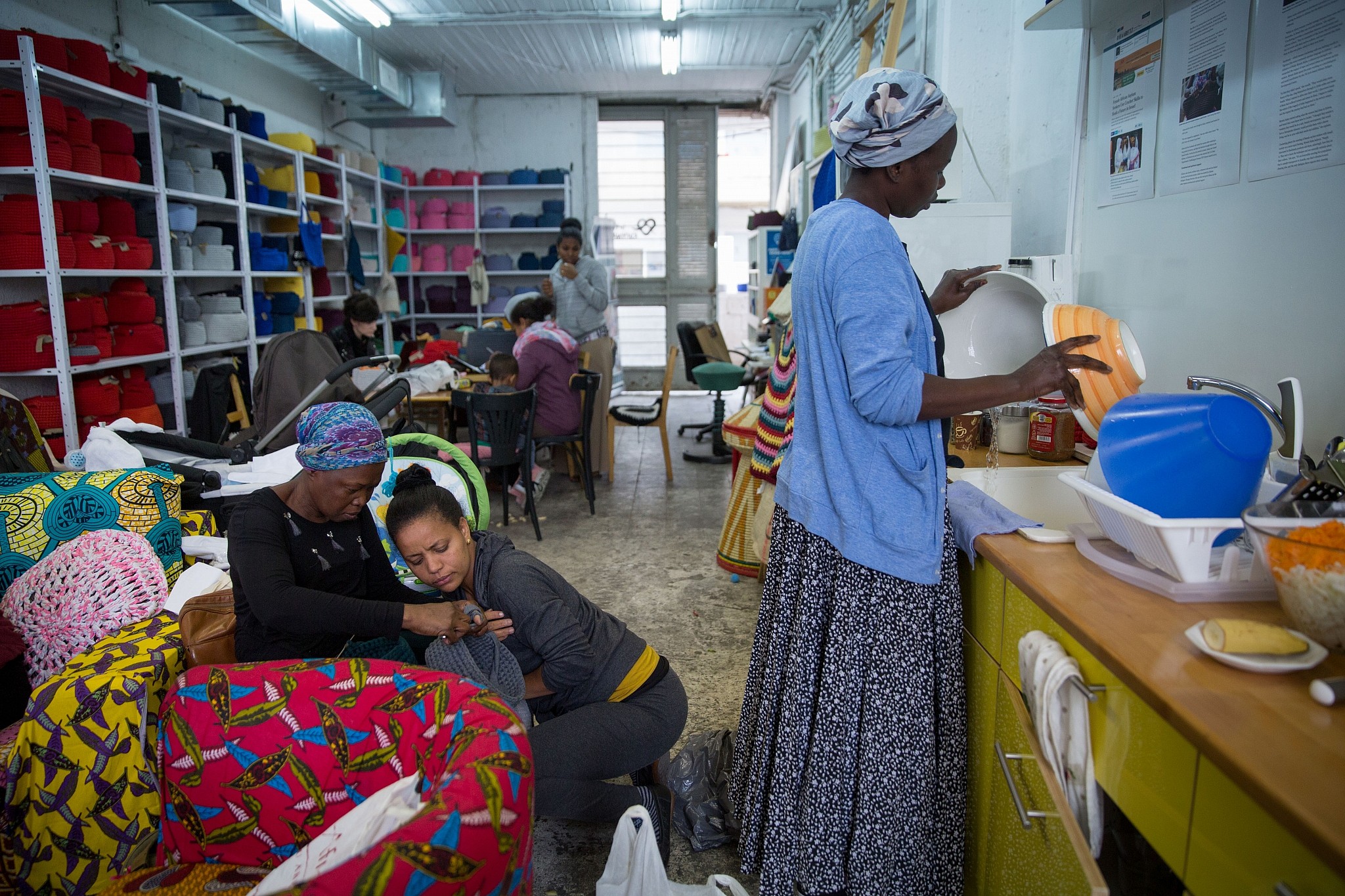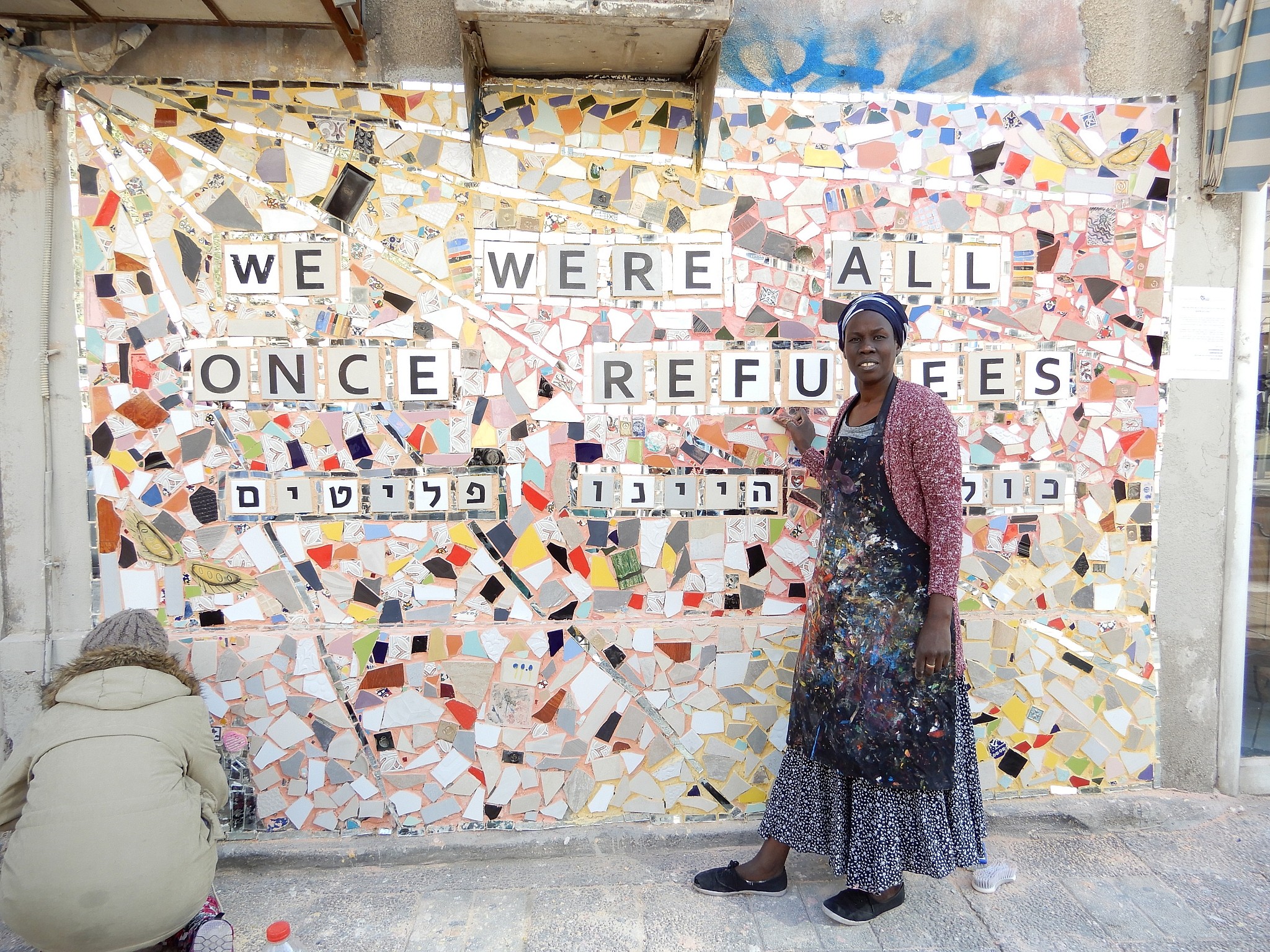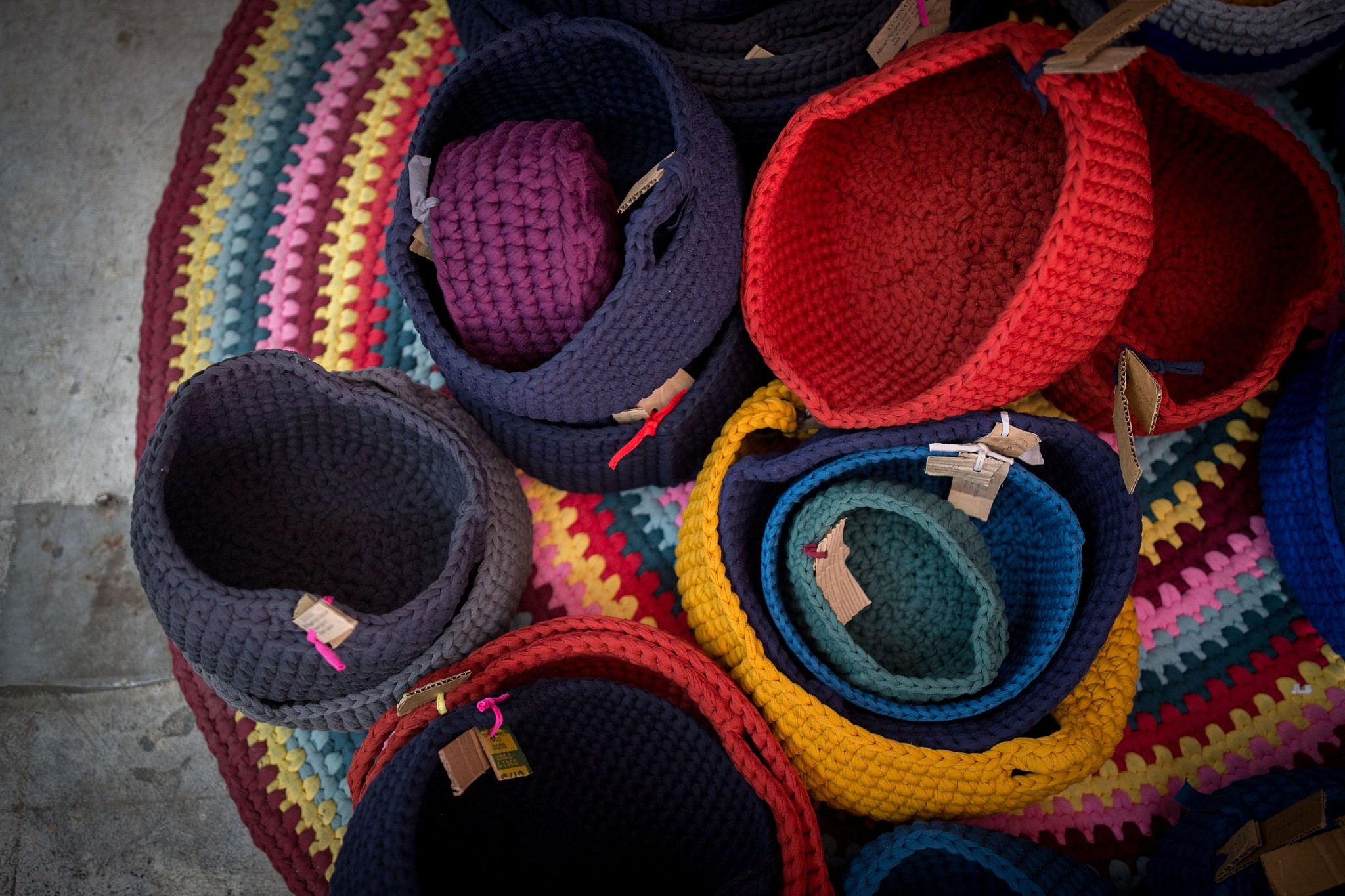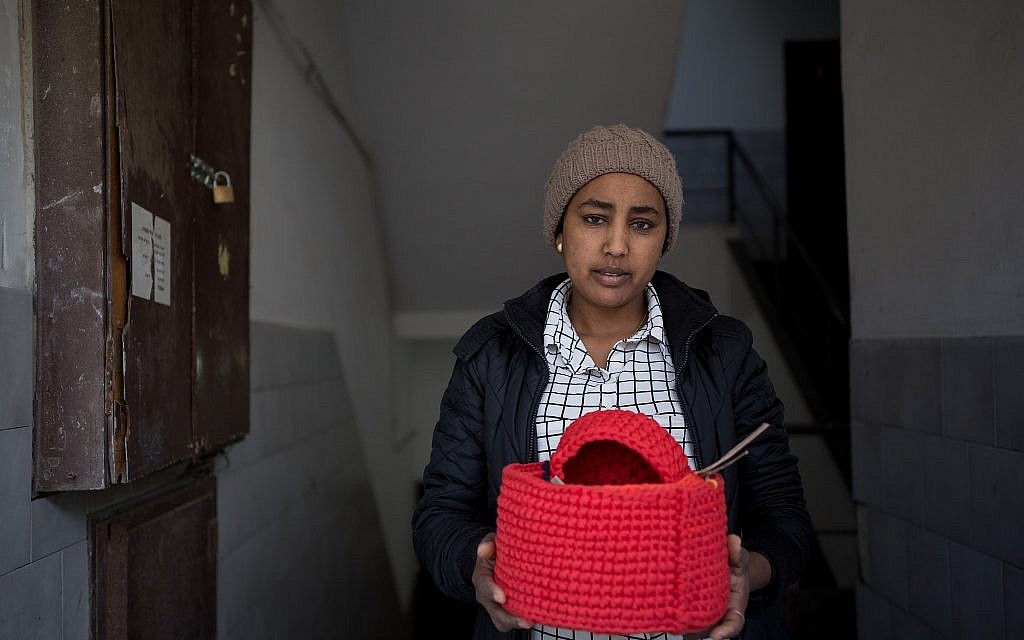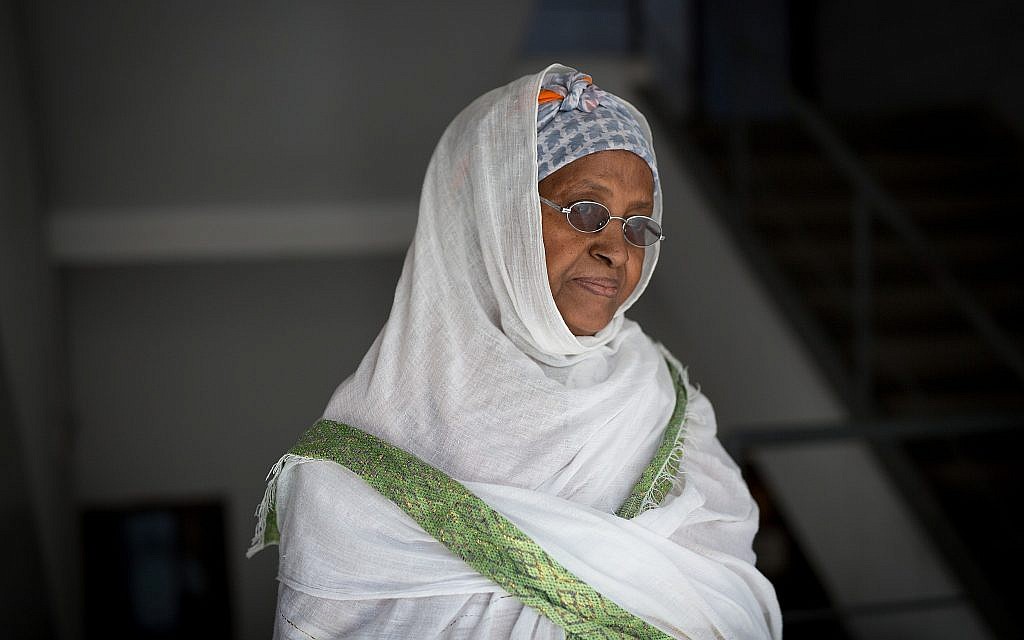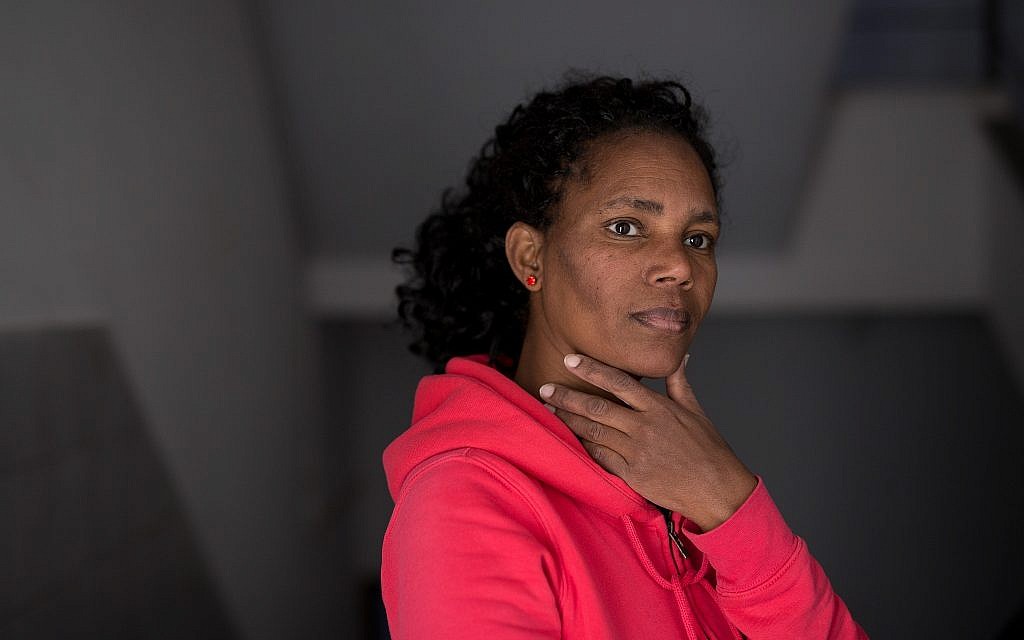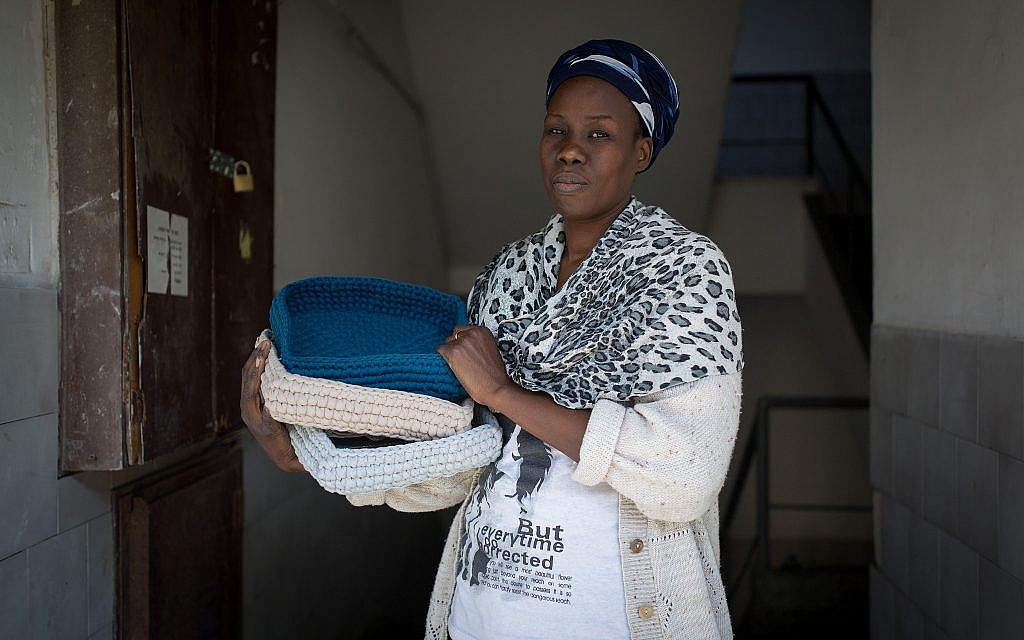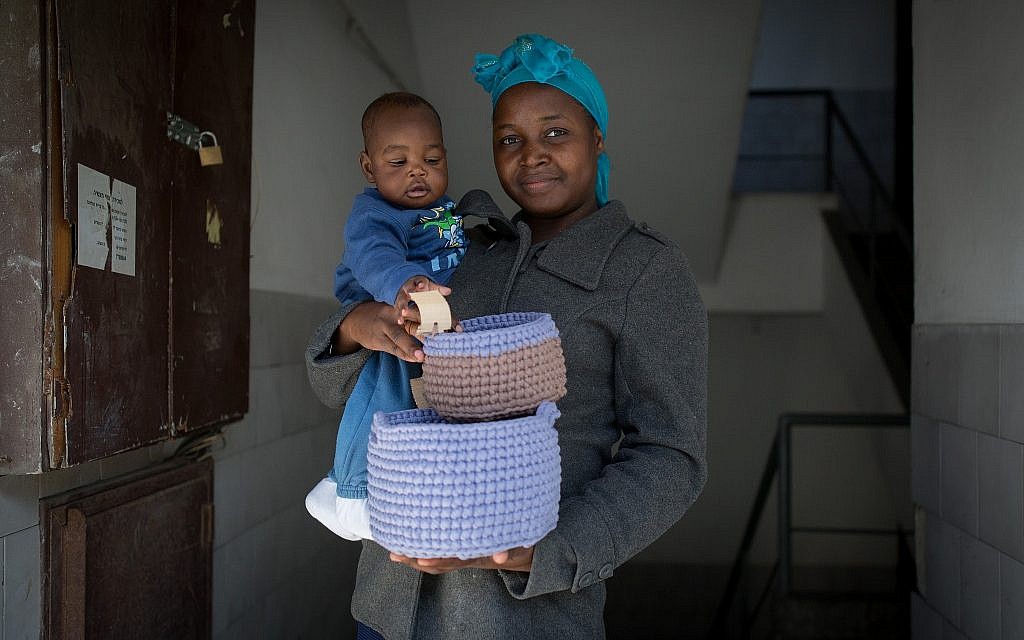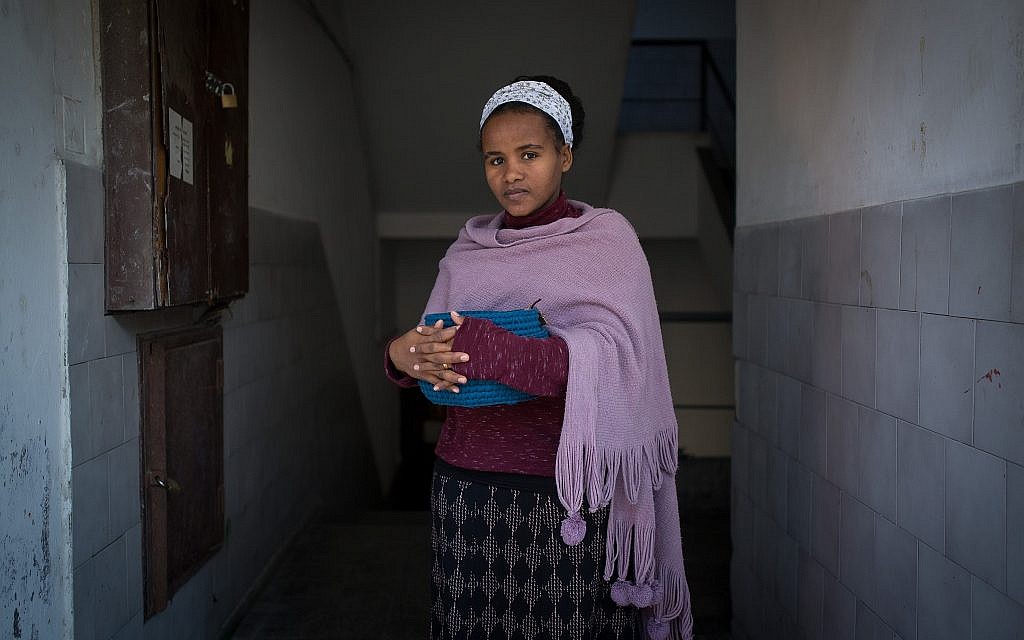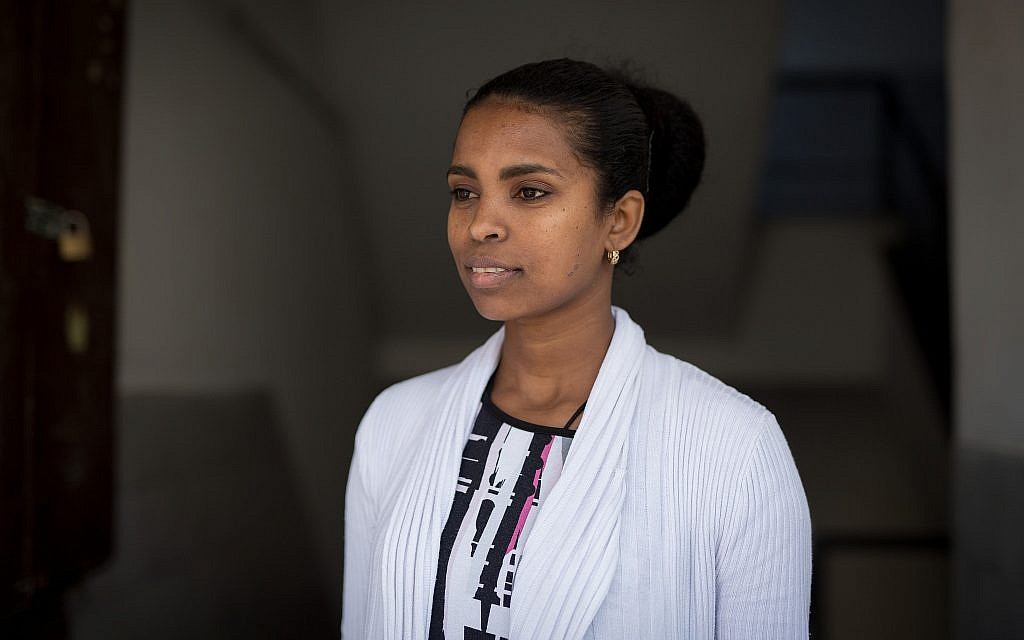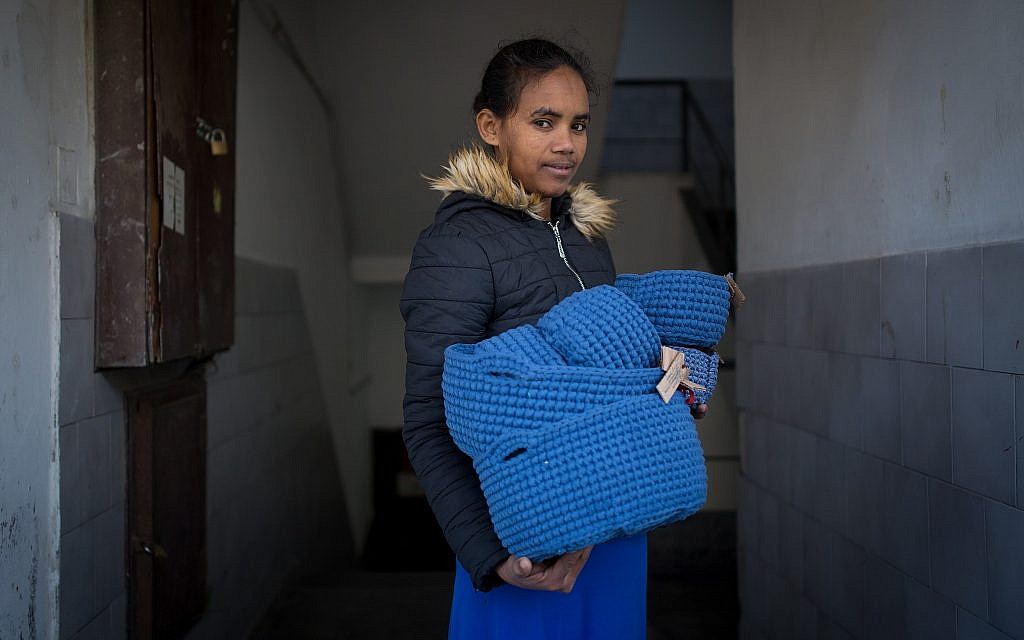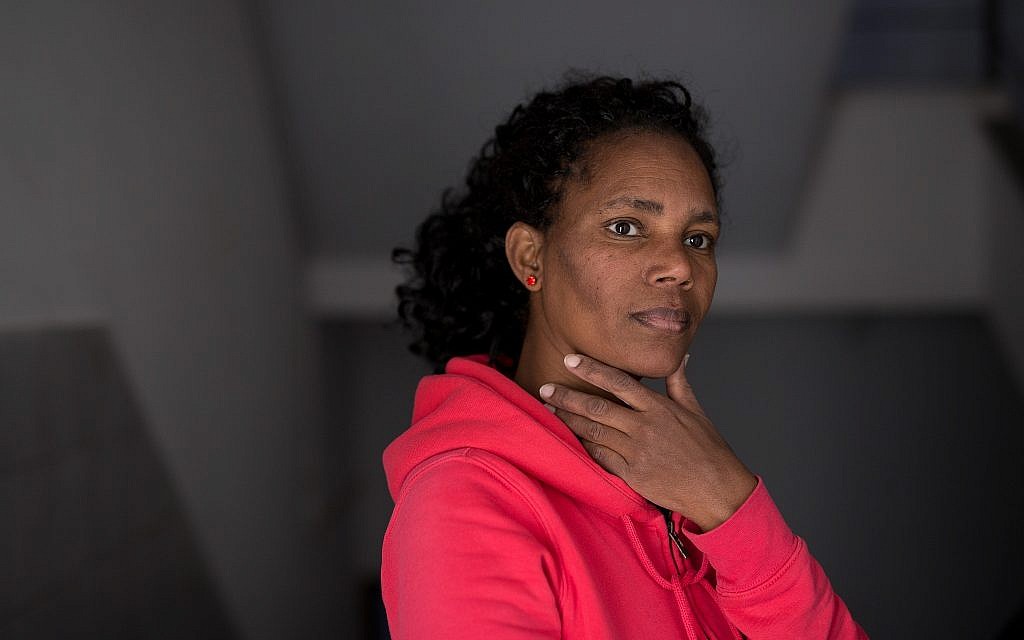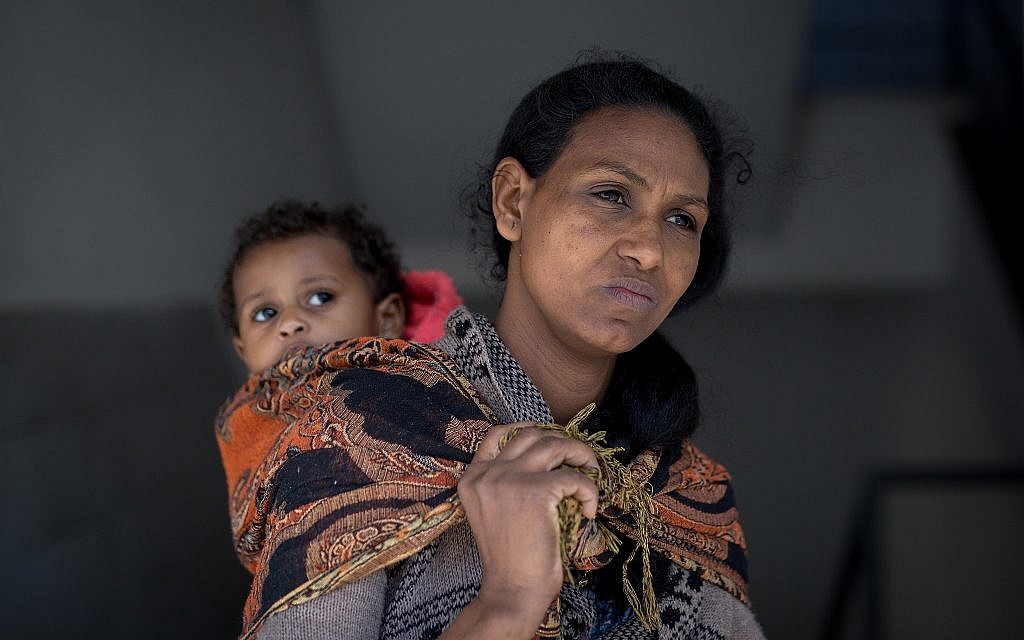'ISRAELIS DEPORTED [THEM] IN THEIR MINDS A LONG TIME AGO'
Empowerment project helps African asylum seekers stitch a safety net
In addition to selling baskets, Kuchinate now hosts Israeli groups in its studio in effort to empower women and help public empathize with their plight
Abrehet, an asylum seeker who works with Kucinate - African Refugee Women's Collective, in Tel Aviv on February 14, 2018. (Miriam Alster/Flash90)
The scent of freshly roasted coffee wafts from a window, over the industrial warehouses of south Tel Aviv. Outside, delivery trucks clank down potholed streets and prostitutes lounge in the doorways as soon as the sun goes down.
But inside the brightly lit workshop of
Kuchinate, a women’s empowerment crafts group for African asylum seekers, it’s a different world entirely. A number of women are explaining the intricacies of a traditional Eritrean coffee ceremony to a group of visiting Israeli students, coupled with freshly popped popcorn and incense.
“For the first time, Israelis see that these women are no longer invisible, they’re able to relate to them as people on an equal level,” said Diddy Mymin Kahn, a psychologist and artist who founded Kuchinate seven years ago with Sister Azezet Kidane, an Eritrean nun living in Jerusalem.
When Israelis visit, they see asylum seekers in a different light. “They’re not doing the traditional work of asylum seekers, cleaning or things like that,” said Kahn. “This increases empathy, and decreases the gap between asylum seekers and the rest of society.”
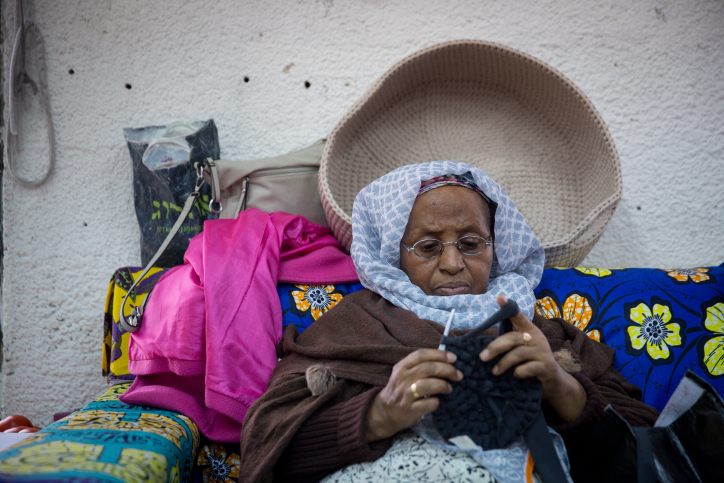
Ejigayehu crochets a basket at the Kuchinate workshop in Tel Aviv, on December 20, 2017. (Miriam Alster/Flash90)
On a recent Wednesday, members of Kuchinate, which means “crochet” in Tigrinya, the language of Eritrea, have cooked lunch for a group of visiting Israeli and international students. They set the colorful table with injera, a flat and spongy Ethiopian/Eritrean bread, and put out bowls of sauces made from chickpeas and lentils. The Israeli students giggle, trying to figure out how to eat lunch with their hands, though the women have graciously set out a few forks for the less adventurous.
In addition to their main work of crocheting bright cloth baskets as part of an economic empowerment project, Kuchinate has now started to host groups for workshops or meals at its Tel Aviv workspace a few days a week, which “helps break down barriers,” said Kahn.
“People are really surprised,” she said. “They come face to face with another culture. They didn’t even think about these women before, they were invisible to them, and now they see these amazing, resilient women, telling about coffee ceremonies, making popcorn, looking at all this magnificent work.”
Eden, in the brown hat, is one of the community leaders responsible for training new members of the collective in crochet patters, pictured here at the Kuchinate workshop in south Tel Aviv on February 14, 2018. (Miriam Alster/Flash90)
Miriam Alster, 36, a veteran Swedish-Israeli photographer for Israeli photo agency
Flash90, has photographed the women of Kuchinate over the last several months as tensions rose over Israeli plans to deport asylum-seekers, capturing moments of joy and camaraderie.
Kahn and Kidane founded Kuchinate in 2011 as an initiative to provide a small income for severely traumatized asylum seekers who are unable to work, including victims of the Sinai torture camps.
Previously, asylum seekers who fled through Sinai to Israel were an example of straightforward smuggling. But in 2010, the average price of smuggling to Israel skyrocketed from $1,500 to $3,000 and then to $10,000. As the Arab Spring raged in northern Africa, Egypt’s military lost control of the Sinai, and it became a lawless area. Countries sealed their borders as the political situation deteriorated further, leaving refugees with fewer routes and smugglers more opportunities to extort their victims.
The Bedouin smugglers realized by kidnapping and torturing refugees passing through the Sinai desert, they could force the refugees’ families to pay huge ransoms. The torture camps were so close to the border with Israel that the smugglers would give the victims cellphones with Israeli SIM cards. Then they would force the victims to call family members who had previously escaped to Israel, or who were still in Eritrea. The smugglers tortured the victims while they were on the phone with their families begging for money, so their family could hear the torture as well. Smugglers demanded sums of $25,000 to $30,000, sometimes as high as $50,000.
Sister Azezet Kidane, co-Director of the Kuchinate collective, dances together with women at their annual Christmas party in the Kuchinate workshop in south Tel Aviv on January 9, 2018. (Miriam Alster/Flash90)
With no new Eritrean asylum seekers coming into Israel since 2014, Kidane had hoped the passage of time would help to heal the deep wounds. But she was wrong.
“I thought it would be worse at the beginning, but after so many years have passed, [the trauma] is actually worse now,” said Kidane. “Because before, they suffered, but they shared problems with some hope, with some vision. They said, ‘we will settle, we will manage, we will forget.’ But the policy of the government of Israel has increased their stress about their situation.”
Fevor, an asylum seeker and member of Kuchinate, crochets a basket at the Kuchinate workshop in Tel Aviv, on January 3, 2018. (Miriam Alster/Flash90)
The women who crochet for Kuchinate are not under threat of deportation, as Netanyahu and the Interior Ministry said that women and children will not be deported from Israel at this stage. But they will certainly be affected. Most of the women at Kuchinate are single mothers who share apartments with distant family or people they know from Eritrea. Kahn spoke of one woman with two children, who shares a room with two of her cousins, both of whom have received deportation notices. “She’ll be on the street,” she said. “Their whole ecology, their whole areas of support are beginning to collapse. They’re feeling really hopeless.”
Kahn said she knows of a few cases in which men were feeling so trapped and desperate that they took the $3,500 payout from the government, leaving their wives and children behind in Israel to fend for themselves.
Kidane counsels women one-on-one as well as doing informal group counseling while the women are crocheting. The informal group therapy is an essential part of the healing process because many women feel uncomfortable, in the beginning, with one-on-one counseling. “We talk together, we drink coffee, we speak about our problems,” said Kidane. “They realize all of them have the same worries.”
Children of the women of the Kuchinate collective at their annual Christmas party in their workshop in south Tel Aviv on January 9, 2018. (Miriam Alster/Flash90)
“Before, they were telling me the story of the past,” said Kidane. “But now there’s the problem of every day worrying. They want to be resettled to a third country because they see no future here. They cannot settle, they cannot progress, because they do not know what will happen tomorrow.”
The asylum seekers do not consider Rwanda and Uganda to be safe options for third country resettlement.
The women at Kuchinate are “the most vulnerable of the vulnerable,” said Kidane, because they cannot work for various reasons. Some have health problems stemming from their time in Sinai torture camps, others are single mothers whose husbands died along the journey or are still in Eritrea. Some have psychological issues, including depression, which in some cases has required hospitalization in a psychiatric ward.
Abretet, 28, an asylum seeker from Eritrea, has been coming to Kuchinate for the past eight months. Her 5-year-old son, Miracle, has undergone brain surgery three times, and Abretet wasn’t able to keep a job while bringing him back and forth to doctor’s appointments. “One day I’d come and then one day I couldn’t come, I couldn’t keep any work,” she said. Every week she crochets 2-4 baskets, which brings in a few hundred shekels (around $100), her only income.
She comes to Kuchinate two days a week, when she can, to sit with the other women and crochet with them. “We work together here, this place belongs to all of us,” she said. “Aziza and Diddy talk to us about our problems, they help us with psychology. Here you can forget your problems. When I’m here, I’m learning something new, and that takes time. But I can say, OK, this is what I’m doing. I have what to do, and that way I don’t feel so bad.”
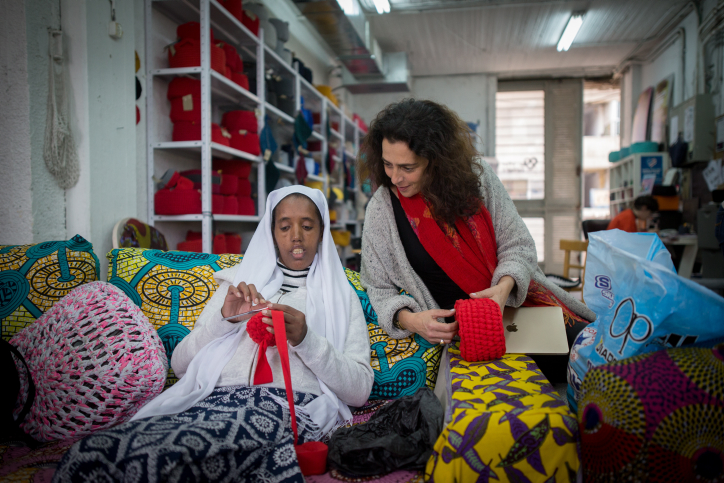
Dr Diddy Mymin Kahn, co-founder and director of the Kuchinate collective, looks on as Selam crochets a basket at the Kuchinate workshop in Tel Aviv, on January 3, 2018. (Miriam Alster/Flash90)
“In the beginning, when I was interviewing [asylum seekers], they said, ‘thank god, I’m alive, I’m in the Holy Land, I will be OK, I will work, I will survive, I will heal,” said Kidane. “But now it has become worse.”
A chance to be a host
Amid the heartbreak of the current reality, Kuchinate provides a welcome escape for the women. As the sunlight pours into the colorful space, the women transform from victims to efficient businesswomen, bustling around the room to ensure their guests have a good experience.
“Women love it when the guests come,” said Kahn. “It’s their space, and when people come into their space, they’re in charge.” Kahn said it is an empowering feeling when asylum seekers are in the position of hosting Israelis, versus their daily existence of feeling like unwanted guests in Israel.
The hosting program, which includes traditional food and seminars about the asylum seeker community in Israel, started a year and a half ago. Groups must coordinate in advance, though the public is invited to visit Kuchinate
online or in person to buy the baskets and other crafts.
Ashok shows her crochet work to Abrehet, while Lina does the dishes following lunch at the Kuchinate workshop in Tel Aviv, on December 20, 2017. (Miriam Alster/Flash90)
The women also sell at malls, craft fairs, and home parties. As the group expanded, from 30 women in 2014 to more than 150 women today, some of the members have taken on leadership roles in positions such as head of sales, product development, quality control, and head of events.
The women run the organization as a collective. They vote as a group to determine the price per basket, which groups to host, where to sell their wares, and what new products to start making. This year, they have started crocheting special square matzah baskets for the Passover holiday.
In the past year, the group has also expanded into collaboration with Israeli artists, including working with
mosaic artist Mia Schon on a mosaic titled “We were all
refugees once” on Rothschild Boulevard in Tel Aviv, and with artist
Gil Yefman on “Body of Work,” an exhibit that will travel to New York, among other activities.
“Someone who sees this will understand the history of Israel and the whole world,” said Lena, 42, an asylum seeker from Sudan, as she cleaned the last bits of grout from the mural on Rothschild Boulevard. “Everyone was once a refugee, everyone once left their home and came to a new place. Someone who reads this can feel it,” she said.
Lina, an asylum seeker from Sudan, with the finished mural on Rothschild Boulevard in Tel Aviv on February 21, 2018. (Melanie Lidman/Times of Israel)
The art collaborations have been very therapeutic and confidence-building for the women, said Kahn, but one of the most important things is the person-to-person interaction that happens at the Kuchinate workshop.
After Israelis visit, they stop talking about asylum seekers as a “them,” and start talking about them as individuals, she said. “You can’t empathize if you’re blind,” said Kahn.
“Deportations is something that’s got to be stopped immediately not only for the asylum seekers at risk of being deported, but also for what the deportations are doing to Israeli society,” she said.
“The physical deportation is happening now, but Israelis deported asylum seekers in their minds a long time ago, not taking care of any issues that are affecting them on a social level. I hope this wakes up Israeli society to take care of asylum seekers on every level, not only to prevent their physical deportation, but to care for them.”
Kuchinate baskets for sale at the Kuchinate workshop in south Tel Aviv on February 14, 2018. (Miriam Alster/Flash90)
Eden, an asylum seeker who works with Kucinate - African Refugee Women's Collective, in Tel Aviv on February 14, 2018. (Miriam Alster/Flash90)
Ejigayehu, an asylum seeker who works with Kucinate - African Refugee Women's Collective, in Tel Aviv on February 14, 2018. (Miriam Alster/Flash90)
Hewan, an asylum seeker who works with Kucinate - African Refugee Women's Collective, in Tel Aviv on February 14, 2018. (Miriam Alster/Flash90)
Lina, an asylum seeker who works with Kucinate - African Refugee Women's Collective, in Tel Aviv on February 14, 2018. (Miriam Alster/Flash90)
Samha, an asylum seeker who works with Kucinate - African Refugee Women's Collective, in Tel Aviv on February 14, 2018. (Miriam Alster/Flash90)
Selam, an asylum seeker who works with Kucinate - African Refugee Women's Collective, in Tel Aviv on February 14, 2018. (Miriam Alster/Flash90)
Selemwit, an asylum seeker who works with Kucinate - African Refugee Women's Collective, in Tel Aviv on February 14, 2018. (Miriam Alster/Flash90)
Zayd, an asylum seeker who works with Kucinate - African Refugee Women's Collective, in Tel Aviv on February 14, 2018. (Miriam Alster/Flash90)
Female asylum seekers who work with Kucinate - African Refugee Women's Collective, in Tel Aviv on February 14, 2018. (Miriam Alster/Flash90)
Mebrit, an asylum seeker who works with Kucinate - African Refugee Women's Collective, in Tel Aviv on February 14, 2018. (Miriam Alster/Flash90)
